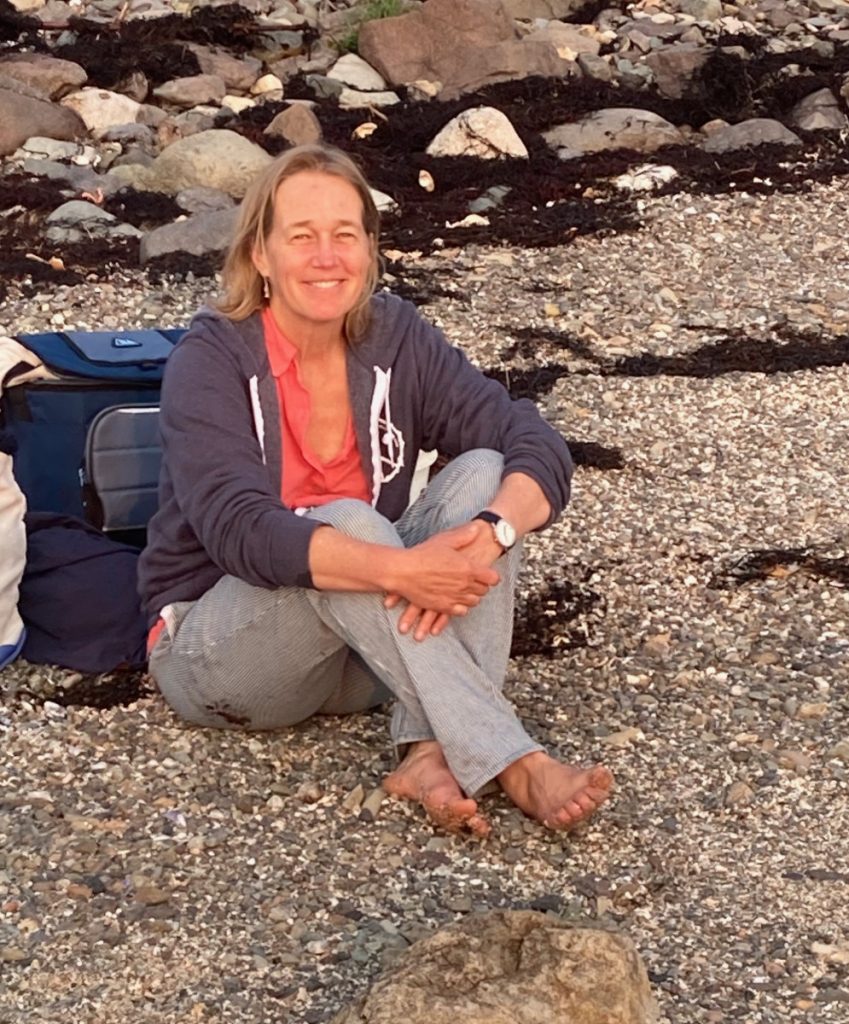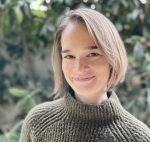
Mary Tharin talks with Alice Greenway (above), author of the novella “Past Perfect” from NER 42.3, about the theme of uprootedness, the problem of the “white savior,” and the importance of holding back and listening.
Mary Tharin: One of the many themes woven through this novella is the sense of being uprooted. The asylum seekers in the camp have been forced to flee from their homes, while the narrator is facing an uprooting in her family life. Did you set out to write a story around this theme, or did the theme emerge from the subject of the refugee camp?
Alice Greenway: I believe I set out with this theme. Uprootedness is a fact of my life and part of what led me to volunteer on Samos. My father was a foreign correspondent and my family moved seven times when I was growing up before we returned to the US. Culture shock and uprootedness are states I know well and I naturally empathize with people of similar backgrounds. The things I don’t know and have not experienced personally are the trauma of being forced to flee, as the Saleems do in the story; the desperation of feeling unwelcome in the place where you seek safety (a place you might have idealized); and the cruel irony that, after making the heartbreaking decision to flee and surviving a dangerous journey across land and sea, your right to move and travel is then taken away from you. And you are caged up in a place very like a prison.
MT: I was struck by the line where the narrator, Nat, describes herself as “longing to save someone.” It reveals, to an extent, what drew her to volunteer at a camp. But the wording is so strong that it seems to speak to something deeper. How do you view this deep need to help? Are external forces prompting her to act, or is she responding to something more personal and internal?
AG: I distinctly remember my own impatient desire when I first arrived on Samos to immediately start saving people. What becomes clear is that Nat, like many volunteers, is also saving herself. Also that the refugees she meets have more to teach her, than she them.
The phrase raises the complicated issue of the white savior. There were American students applying to volunteer in Samos who were so torn up about subconscious motivation and possible harm they might cause that their applications read like a tortured list of reasons why not to act. Robert, in the story, expresses one extreme when he accuses Nat of collusion and argues that total breakdown is the only way to force change.
My own experience was that treating people with kindness and respect and dignity and simply providing communal and educational activities when people were stuck in limbo for such a long time was helpful. Connection is good. So is saving oneself. As I get older, I hope I’m learning to restrain my desire to rush in and save and am learning instead to hold back and listen.
MT: Shabnaz is such a strong character; authentic, vivacious, and very much herself despite the circumstances. The relationship between Shabnaz and the narrator in large part drives the story, as I read it. Do you agree? What do these two women have to teach each other?
AG: The friendship between Shabnaz and Nat is the heart of the story. I honestly don’t know what the narrator has to teach Shabnaz. Certainly not the verb tenses! I’d have to rewrite the story from Shabnaz’s point of view to really know what Nat has to teach. They like each other but that is not teaching. What Shabnaz exemplifies for Nat is the power of the will to survive and a woman’s fierce desire and ability to protect her family, which includes both her children and her husband. An unabashed female strength and humor.
MT: Refugees as are often presented in the news as a nameless, faceless group. But the characters in your story are all individuals, with distinct personalities and backgrounds, who are all dealing with their circumstances in unique ways. Was it your intention to write a story that would encourage readers to engage with these characters as complex individuals?
AG: I began my childhood in Hong Kong when there was a great surge of refugees from Mainland China fleeing the Cultural Revolution and later came the “boat people” from Vietnam. Refugees were very present and they all had faces. In fact the majority of Hong Kong people are descendants of refugees. So no, I don’t think that was a motivation for me. It was more journalistic. I wanted to capture what it was like on Samos at that particular time both at the refugee camp and for volunteers. Things changed quickly. Conditions in the camp got much worse and more overcrowded to the point where tents and makeshift shelters sprawled out over the hillside (as in 1960s and ’70s Hong Kong). When the Greek government took over management of the camp, they closed it off to volunteers and observers—though anyone could walk through the “jungle” all around and see how broken the camp was.
I remember refugees telling me—if only the Greeks and UNHCR and others could learn to employ refugee talent. There are so many teachers and carpenters and doctors and cooks in the camp—if only this talent could be welcomed and nourished and put to use. The camp could have become a multicultural haven. Tourists might now be flooding into the town of Vathy to sample its vibrant Afghan, Syrian, Algerian, and Congolese restaurants and music. Instead it remains a down-at-the-heels port with a “refugee problem.”
MT: What is the current status of the camp on Samos?
AG: This fall, the Greek government moved refugees to a new, modern, more sterile camp far from the port and studded with floodlights, barbed wire, and cameras. Bravely and stalwartly Samos Volunteers, the NGO I volunteered with, has constructed a new base right up against this prison, where they still provide classes and social activity and friendship.
Many of the young volunteers who traveled to Samos for a month to help have wound up dedicating their lives to this cause, becoming social workers, teachers, human rights or immigration lawyers, and learning Arabic and Dari and Pashto. I take off my hat to each one. It’s a way I would have liked to have spent my life. Selfishly, I remain a part-time, nomadic scribbler.
Read an excerpt from the novella here.

Mary Tharin is a fiction reader for NER. Her short stories have appeared in Sixfold, Five on the Fifth, and Collective Realms, among others. A native of California, she now lives in Italy where she teaches English.